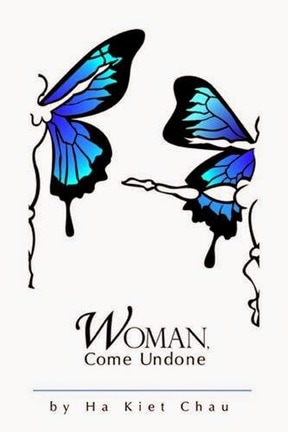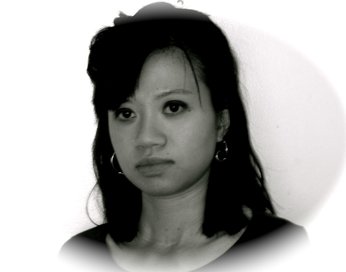Woman Come Undone by Ha Kiet Chau

Paperback: 49 pages
Publisher: Mouthfeel Press (2014)
Purchase: @ Amazon.com
Review by April Michelle Bratten
Ha Kiet Chau’s Woman Come Undone begins with "A Blue Unraveling". However, the woman, who quite literally comes undone with a blue sweater being stripped from her body, is not afraid. In fact, she has given herself “permission/to come undone.” What does it mean to let go completely, of mind, body? In this collection of poetry, Chau explores how one must come undone in order to be reborn.
Throughout Woman Come Undone, Chau’s refreshing speaker acknowledges her flaws and yet never feels pressured to apologize for them. This does not seem to be because the speaker is without vulnerability, on the contrary, she simply accepts this vulnerability as an attribute:
…and the stars,
who invited them in?
They hang above our heads
like crystal chandeliers.
He says, don’t look at me, too late,
the light magnifies our imperfections.
He edges further away as if the glare
of yellow hurts his skin.
I can’t function in dark ambiance.
I have no choice, but to stand
under inspection, under chandelier light.
He tells me my dress is too sheer
and underneath,
he says my weaknesses, my faults,
they glow like fluorescent stars.
(from "Chandelier Light")
Chau’s writing is sensuous, bold, and bright. Up the Staircase Quarterly published her poem “murder a tree” in 2016, and a similar unique and colorful imagery flows throughout Woman Come Undone. Chau writes of a “spanking, white-hot, new transformation”, of waking up to “twenty wild black and white/spotted stallions galloping in an open field, long manes glossy/from the morning dewdrops”, and having a “blueberry ache.” The reader never quite gets situated inside of Chau’s poems, which are a welcome intrusion on the senses. Unpredictable, and at times dizzying, Chau’s imagery mirrors the overall concept of the book--growing beautifully undone until one becomes bare, free.
Woman Come Undone sets the broadest portion of its focus on exploring identity. Chau’s poems navigate romantic, familial, and platonic relationships to gain a better understanding of personal identity. Instrumental to Chau’s identity is her mother, a survivor of the Vietnam War, and the assumed speaker of the poem “A Woman’s Warfare”:
Sidewalks of a murdered Hanoi, ruined mounds
of black mountains barring women from ever climbing to the top.
Death tugs my hand, heaves me closer to a light.
Death fights for the fast pulse of my wrist,
for the eight-month fetus in my belly.
Our bodies run for a nearby underground tunnel, our single escape.
We hide like timorous red crabs under protective shells,
as mature men beg for a mercy they rightfully deserve,
for a more lenient peace.
When vulnerability is strength, when a flaw becomes essential to character, when “the wild poet unfastens her pearl lotus clips, shakes her/black hair down”, the reader is both pleasantly surprised and not surprised at all. Chau’s style is easy to read, but the confidence with which these poems were written is what keeps the reader entranced. Chau’s unabashed Woman Come Undone gives the reader cause to inspect and then celebrate their own fine print.

HA KIET CHAU is a writer from Northern California. Her poems have been published in New Madrid, Ploughshares, Mission at Tenth, Sierra Nevada Review, and Kalyani Magazine, among others. She is also a recipient of the 2014-2015 UCLA Extension Writers’ Program Scholarship. Her chapbook, Woman Come Undone, is available from Mouthfeel Press. For more of her work, visit her at http://hapoetryblog.tumblr.com/
